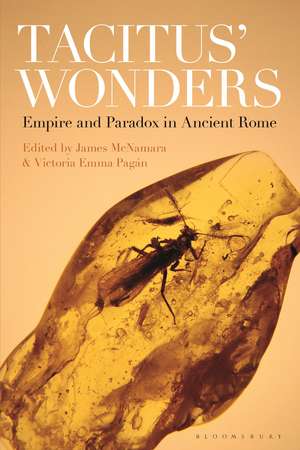Tacitus’ Wonders: Empire and Paradox in Ancient Rome
Editat de Dr James McNamara, Professor Victoria Emma Pagánen Limba Engleză Paperback – 19 apr 2023
| Toate formatele și edițiile | Preț | Express |
|---|---|---|
| Paperback (1) | 168.22 lei 6-8 săpt. | |
| Bloomsbury Publishing – 19 apr 2023 | 168.22 lei 6-8 săpt. | |
| Hardback (1) | 439.01 lei 6-8 săpt. | |
| Bloomsbury Publishing – 9 feb 2022 | 439.01 lei 6-8 săpt. |
Preț: 168.22 lei
Preț vechi: 216.73 lei
-22% Nou
Puncte Express: 252
Preț estimativ în valută:
32.19€ • 33.41$ • 26.91£
32.19€ • 33.41$ • 26.91£
Carte tipărită la comandă
Livrare economică 17-31 martie
Preluare comenzi: 021 569.72.76
Specificații
ISBN-13: 9781350241732
ISBN-10: 1350241733
Pagini: 296
Dimensiuni: 156 x 234 x 25 mm
Greutate: 0.46 kg
Editura: Bloomsbury Publishing
Colecția Bloomsbury Academic
Locul publicării:London, United Kingdom
ISBN-10: 1350241733
Pagini: 296
Dimensiuni: 156 x 234 x 25 mm
Greutate: 0.46 kg
Editura: Bloomsbury Publishing
Colecția Bloomsbury Academic
Locul publicării:London, United Kingdom
Caracteristici
Offers a new appraisal of the nature of Tacitus' historical enquiry by examining the problematic moments when readerly credulity is challenged
Notă biografică
James McNamara is a DAAD-Prime Postdoctoral Research Fellow at the University of Potsdam, Germany. Victoria Emma Pagán is Professor of Classics at the University of Florida, USA.
Cuprins
Notes on ContributorsList of AbbreviationsIntroduction (James McNamara, University of Potsdam, Germany and Victoria Emma Pagán, University of Florida, USA)Part 1: Tacitus and Paradoxography1. Tacitus and Paradoxography (Kelly Shannon-Henderson, University of Alabama, USA)2. Beyond Ira and Studium: Tacitus and the Hellenistic Anxiety about Wonder (Rik Peters, University of Chicago, USA)3. Wonderment in Aper's Second Speech in Tacitus' Dialogus de Oratoribus (Art Pomeroy, Victoria University of Wellington, New Zealand ) 4. Laus eloquentiae and fama rerum: The paradox of the socially marvellous in Tacitus' Dialogus and Agricola(Brandon Jones, Boston University, USA)Part 2: Interpreting Wonders 5. Marvellous Predictions: Wonders as Metahistory in Annals 6 (George Baroud, Emerson College, USA) 6. Prodigiosum Dictu: Interpreting Signs and Oracles in Tacitus' Histories (Callum Aldiss, Victoria University of Wellington, New Zealand) 7. Interpreting wonders in the Agricola and Germania (James McNamara, University of Potsdam, Germany) Part 3: The Principate as Object of Wonder 8. qualem diem Tiberius induisset: Tiberius' Absences on Capri as an Inspiration for onder and Uncertainty (Panayiotis Christoforou, University of Oxford, UK) 9. Tacitus' Tragic Touch: Vespasian' Healing Miracles at Histories 4.81-3 (Holly Haynes, The College of New Jersey, USA) 10. Tacitus' Ordinary Wonders (Victoria Emma Pagán, University of Florida, USA) Index
Recenzii
This book goes beyond the apparent artistic/anecdotal function of wonders in innovative ways and sheds light on how knowledge of the world is constructed in Tacitus' works through miracula.
A fascinating exploration of the discourse of wonder, which addresses significant issues about ancient historiography and ancient concepts of knowledge. By challenging views of Tacitus which co-opt him to a modern standard of historiography, this book uncovers the diverse perspectives from which the world is understood in the Tacitean texts.
The volume is certainly successful in achieving its aims and making us appreciate Tacitus' marvels not as an aberration or embarrassment in an otherwise rational discourse, but as an integral part of his didactic and historical intentions . There are many cross-references between the individual contributions, so that the collection, with a very carefully placed first and last chapter, reads like a wonderfully coherent exploration of a fascinating topic.
[T]here is much of interest here, and the papers are all well-written and demonstrate a proper command of the appropriate modern scholarship
A fascinating exploration of the discourse of wonder, which addresses significant issues about ancient historiography and ancient concepts of knowledge. By challenging views of Tacitus which co-opt him to a modern standard of historiography, this book uncovers the diverse perspectives from which the world is understood in the Tacitean texts.
The volume is certainly successful in achieving its aims and making us appreciate Tacitus' marvels not as an aberration or embarrassment in an otherwise rational discourse, but as an integral part of his didactic and historical intentions . There are many cross-references between the individual contributions, so that the collection, with a very carefully placed first and last chapter, reads like a wonderfully coherent exploration of a fascinating topic.
[T]here is much of interest here, and the papers are all well-written and demonstrate a proper command of the appropriate modern scholarship
